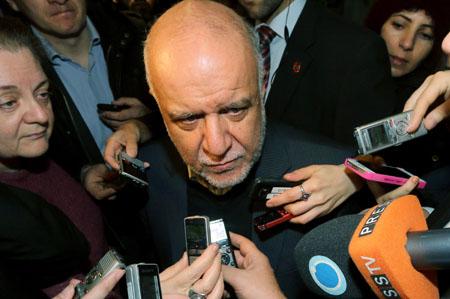You are here
Brent crude oil dips below $46 a barrel, lowest since early 2009
By Agencies - Jan 13,2015 - Last updated at Jan 13,2015
LONDON — Oil tumbled to six-year lows Tuesday on global oversupply and after Saudi Arabia, kingpin of the Organisation of Petroleum Exporting Countries (OPEC) said the era of $100 crude was over, analysts said.
At 1243 GMT, February Brent crude was down $1.48 at $45.95 a barrel, after dipping to $45.19, its lowest since March 2009.
US crude for February was down $1.23 at $44.84 a barrel, off an intraday low of $44.20.
"Today a Saudi official reiterated the belief ... that the days of $100 oil are over," said analyst Daniel Sugarman at traders ETX Capital.
"It is unclear whether this is truly what is felt in the corridors of power in Riyadh, or just something intended to stress the firm resolve of OPEC's leading member not to back down from its stance of no output reduction," he added.
Global oil prices have slumped by almost 60 per cent since June, as the market faced abundant supplies, demand fears and a strong dollar in a stuttering global economy.
The slide accelerated in November when OPEC maintained its production ceiling at 30 million barrels per day.
UAE seeks US output cut
The United Arab Emirates (UAE) said Tuesday that the group could not stop world prices plunging, and called for a cut in booming shale oil output in the United States.
Analysts say that richer OPEC members, like the UAE and Saudi Arabia, have been ready to accept the price fall in the hope that it will force higher-cost shale producers out of the market.
"We cannot continue to be protecting a certain price," UAE Energy Minister Suhail Al Mazrouei said.
"We have seen the oversupply, coming primarily from shale oil, and that needed to be corrected," he told participants in the Gulf Intelligence UAE Energy Forum in Abu Dhabi.
Describing OPEC's November decision not to cut output as the right one, he said:
"The strategy will not change". By not reducing output, "we are telling the market and other producers that they need to be rational".
The breakneck growth in shale oil output has made the United States a major producer again and has led to reduced need for crude imports from the Middle East.
Kuwaiti Oil Minister Ali Al Omair said meanwhile that "nobody can justify the drop now", but "we expect this situation to continue until the surplus on the market is absorbed and the world economy improves."
He added that forecasts indicate that this will not happen before the second half of 2015.
Oil had already collapsed on Monday after Wall Street investment bank Goldman Sachs slashed its price outlook for the commodity, adding to anxiety about a global oversupply, weak demand and soft growth in the key Chinese and European markets.
Rather than cutting output to try to balance the market, OPEC producers are offering discounts to customers in an attempt to defend market share.
"The market is in a bit of a panic now and the momentum is really quite negative. We haven't seen any actions or comments that could reduce this aggressive selling," said Ole Hansen, senior commodity strategist at Saxo Bank.
No china boost
Oil prices have fallen so far that the front-month February contract is now trading about $7 below the July contract, encouraging traders to hire tankers to store oil at sea.
"Once floating storage starts, there is very little support on the downside for Brent spreads," analysts at Energy Aspects said in a note.
Storage plays work when traders can buy cheap oil to sell at a higher price at a future date. Deflationary pressures are beginning to build in both Asian and European economies as demand remains weak. UK inflation dipped to a 14-year low in December.
The downward pressure so great that even record Chinese crude imports for December, above seven million barrels per day for the first time as the world's second largest oil consumer took advantage of low prices to build up reserves, could not lift the market for long.
Banks have slashed their oil price outlook, with analysts at Goldman Sachs cutting their average forecast for Brent in 2015 to $50.40 a barrel from $83.75.
Deutsche Bank cut its Brent forecast to $59.40 a barrel from $72.50, saying physical oil market fundamentals in the first half of this year were the weakest since 1998. "We see few signs that production curtailment is about to happen any time soon," they said in a note.
Separately, Iranian President Hassan Rouhani said on Tuesday that countries behind the fall in global oil prices would regret their decision and warned that Saudi Arabia and Kuwait would suffer alongside Iran from the price drop.
"Those that have planned to decrease the prices against other countries will regret this decision," Rouhani said in a speech broadcast on state television.
"If Iran suffers from the drop in oil prices, know that other oil-producing countries such as Saudi Arabia and Kuwait will suffer more than Iran," he added.
Earlier this month, Iran described Saudi Arabia's inaction in the face of the six-month price slide as a strategic mistake, but hoped that the kingdom, Tehran's main rival in the Gulf, would respond.
On Tuesday, Rouhani singled out Kuwait and Saudi Arabia's budget dependency on oil exports.
Data showed that 80 per cent of Saudi Arabia's budget is based on oil sales, while in Kuwait the figure stands at 95 per cent, he said in a speech in the city of Bushehr.
In 2013, oil accounted for roughly 90 per cent of Saudi Arabia's overall budget income and Kuwait at 92 per cent, according to Reuters' calculations based on official data.
On the other hand, only one-third of Iran's budget is based on oil sales, with an estimated 60 per cent of the country's exports tied to oil, Rouhani said.
Due to Western sanctions on Iran over its nuclear programme, Iran's oil exports have dropped from 2.5 million barrels a day in 2011 to about 1 million barrels per day on average, according to the US Energy Information Administration (EIA).
Iran had adjusted to the drop in exports due to higher oil prices, but that buffer no longer remains today.
Saudi Arabia and other wealthy Gulf Arab countries have accumulated hundreds of billions of dollars of reserves due to high oil prices over the years.
Saudi authorities appear confident they can ride out the market slide, with state spending set to hit a record this year.
Related Articles
The Organisation of Petroleum Exporting Countries (OPEC) will keep its production ceiling steady at its "toughest ever" meeting this month, a former adviser to oil kingpin Saudi Arabia said after global crude prices hit a four-year low.
US shale drilling may be slowing, but not fast enough for the Organisation of Petroleum Exporting Countries (OPEC) to change policy at its June meeting or to prevent oil prices maybe falling more, in the view of the group's Gulf members.
Organisation of Petroleum Exporting Countries (OPEC) Gulf oil producers will not propose an output cut on Thursday, reducing the likelihood of joint action by OPEC to prop up prices that have sunk by a third since June and raising the prospect of a global oil price war.

















